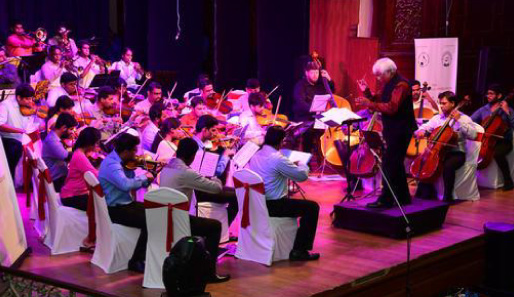Music matters
An orchestra is a large instrumental ensemble typical of classical music, which mixes instruments from different families, grouped in sections. A full-size orchestra may sometimes be called a symphony orchestra and the number of musicians can vary sometimes, even being over a 100 musicians.

Recently, the Madras Music Association (MMA) Choir and Symphony Orchestra, in Chennai, invited students from schools across the city to attend a special musical instrument appreciation event. The students were introduced to the many different musical instruments that are a part of an orchestra.
Members of the orchestra were introduced — some who had been playing an instrument for many years and some youngsters (in Stds X and XII) who have been playing for the past three to four years. It only goes to show that you can pick up an instrument at any age and learn it. Musical instruments are divided into four families: string, wood wind, brass and percussion.
Much like actual families, instruments in each of these families have their own roles to play. Alone, they make a distinct sound so different from each other but when played together, they make beautiful melodies.
Playing an instrument
“Age plays an important role when it comes to learning an instrument,” says Augustine Paul, the MMA Music Director. “During the earlier years, a child’s mind is open, making it easier for him/her to control the fingers and muscles when playing an instrument. This is something that gets more difficult to do as you get older.” He adds that it is always good to have some form of extracurricular activity apart from studies, and learning an instrument is an excellent way of doing so, as it helps develop many skills.
“One of the best things about music is that gender doesn’t play any roles,” says Augustine. “There is no instrument that only boys can play or only girls can play. In fact, when you watch an orchestra come together, you see boys and girls come together too playing various types of instruments.”
There are many benefits of playing an instrument. At the appreciation event, children were encouraged to try out various instruments. Research has shown that playing an instrument can help in your studies, improve concentration and memory power, as well as develop IQ, thus making you smarter. But, how do you choose which instrument is the best for you? Well, Augustine says, one way to find out is to try and listen to the sounds of instruments that interests you, watch videos of how they are played and how it sounds when mixed with other instruments. If you like the way it sounds, then pursue it.. “Another key factor to help you decide is a good teacher,” he adds. “A teacher can not only teach you how to play an instrument well, but can also help motivate and inspire you to continue playing a particular instrument.”